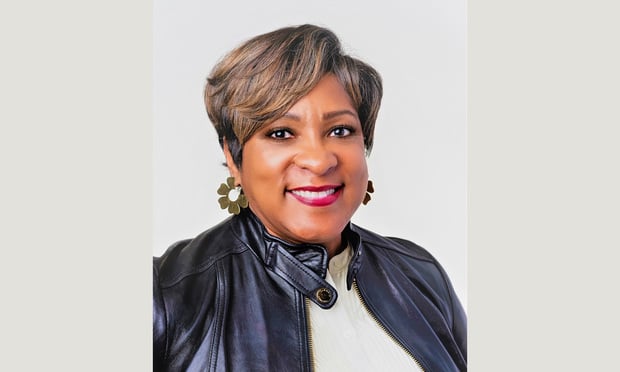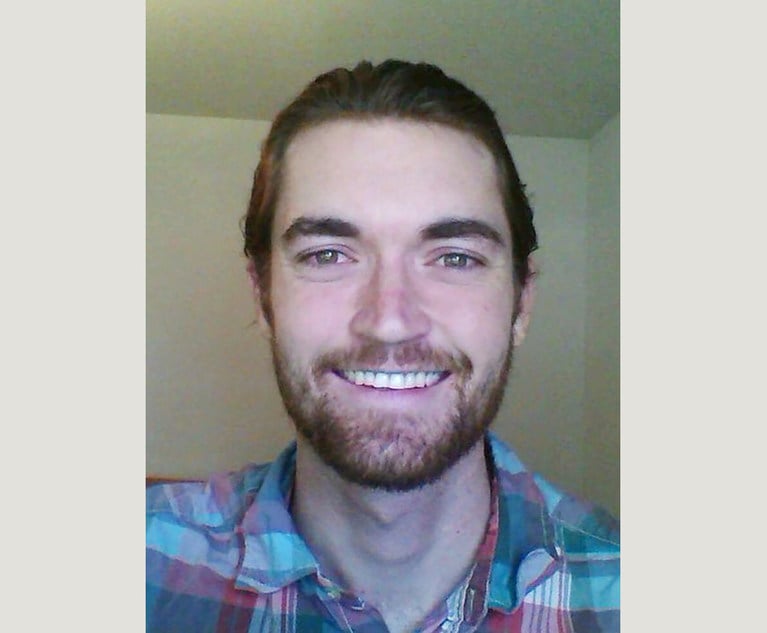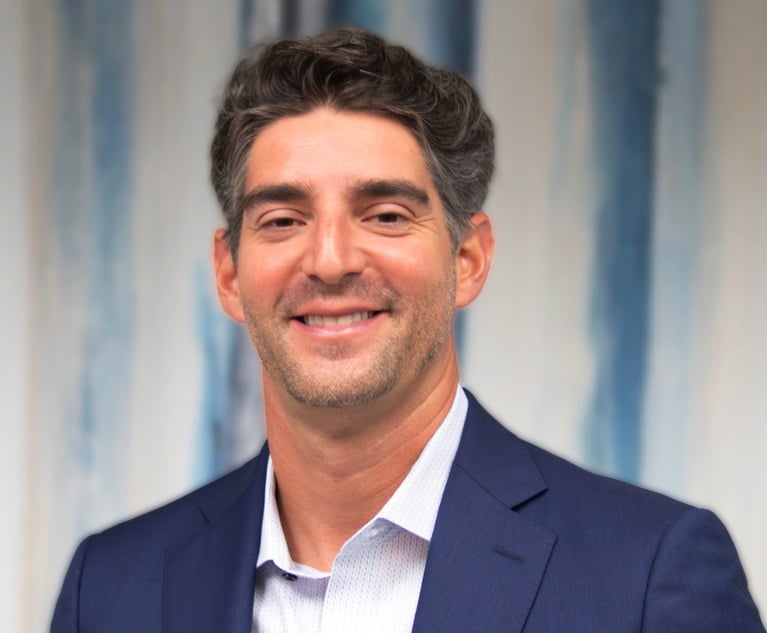'I Just Couldn't Give Up the Dream.' In-House Lawyer Discusses Long Route to Law
After 15 years of working and raising children, Angela Frazier was finally able to study law. Now she is an in-house counsel at Cox Communications.
October 04, 2019 at 11:31 AM
9 minute read
 Angela N. Frazier, assistant general counsel, Cox Communications. (Courtesy photo)
Angela N. Frazier, assistant general counsel, Cox Communications. (Courtesy photo)
Angela Frazier is assistant general counsel at Cox Communications, the arm of Cox Enterprises that provides cable television and other digital services around the country. She also is president of the Georgia chapter of the Association of Corporate Counsel.
She agreed to answer the following questions about her career and her current role.
Q: What interested in you about law, and what was your route to joining the bar?
I attended college at Loyola University in New Orleans, where I was born and raised. Shortly before graduating, I was contemplating whether I wanted to launch my career as a graphic designer, as planned, or go back to school. I quickly concluded that law school would be my next destination. It was an easy decision, because I believed I possessed the personality traits that work well for most attorneys, including being logical, analytical and enjoying a good debate. However, my journey to law school would be much longer than expected and quite different than most.
After graduating, I was accepted into Loyola University School of Law. However, right before I was scheduled to start law school, my mother was suddenly transferred to Atlanta as part of her job with AT&T. Because Atlanta seemed to offer better economic opportunities at the time, I decided to withdraw from law school in New Orleans and follow my mother to Atlanta. I fully intended to pursue law school once I arrived in Atlanta.
Almost immediately after my arrival, I was fortunate enough to secure a job at AT&T. Five years later, I made the decision to pursue law school again. Much to my dismay, I learned that my previous LSAT score had expired. I started preparing to retake the LSAT and was enrolled in an LSAT prep course when I discovered I was pregnant with twins. Law school was once again put on hold.
In 2001, after 15 years of working for AT&T in various jobs, including project management, and raising twin boys, I decided, for the third and last time, to pursue law school. I just couldn't give up the dream. Again, I prepared for and took the LSAT. To my surprise, I was once again accepted into Loyola University School of Law and offered a partial scholarship. I eventually relocated my family back home to New Orleans, where we remained until I graduated from law school in 2004.
Q: After law school, you went to work at what is now Kilpatrick, Townsend & Stockton. What areas of law did you practice?
During law school, I was fortunate enough to work as a summer associate at what was then known as Kilpatrick Stockton. I was scheduled to rotate through several groups, including real estate, litigation and trademark, which was a hot area of law at the time. After my 2-week rotation through real estate, I began my rotation in the litigation group. I immediately knew that litigation was where I wanted to focus my practice. As a result, I forfeited my rotation through the trademark group and spent the remainder of my time as a summer associate in the litigation group. That extra time in litigation paid off, as I was eventually offered a job as an associate in the litigation group.
After graduating from law school, I moved back to Atlanta and started working in the commercial and technology litigation groups at Kilpatrick. I remained there for eight years before transitioning to Cox Communications.
Q: How'd you come to work at Cox Communications?
I was working at Kilpatrick when the recession hit. Meeting the billable hour requirement became a challenge for many, including me. So I started looking for other opportunities. Ultimately, I decided to pursue an in-house position that would allow me to combine my corporate background with my legal background.
I knew finding an in-house litigation position would be challenging. During my job search, I unexpectedly found myself competing with attorneys who were far more senior than me and had suffered job losses or hardships during the recession. After two years of searching and interviewing, I was notified by several people that Cox Communications was looking for a litigator. I researched the opportunity and found that my skills, including my communications background with AT&T, were well suited for the position. I eventually submitted my resume and went through a series of interviews. Fortunately, I was offered the position and started working at Cox in 2012. I started as corporate counsel in the litigation group and was eventually promoted to senior counsel. In 2017, I was promoted to assistant general counsel, which reports directly to the general counsel, Jennifer Hightower.
Q: What are your responsibilities at Cox Communications, and how many lawyers and other staff do you oversee?
I lead the litigation team at Cox Communications. I have an attorney and senior paralegal that work with me. We manage all litigation matters at Cox Communications, except "Top Tier" matters, which are managed by our Litigation Center of Excellence at the parent company, Cox Enterprises. My team and I also manage all arbitrations and prelitigation disputes with customers, vendors and third parties. I also supervise a team of three subpoena coordinators, who process subpoena requests from around the country, and I serve as the company's attorney for bankruptcy, credit and collection matters.
The work load can be daunting at times. My project management background helps me manage my time, prioritize tasks and organize the workload. It also helps that I have learned to delegate. I realized very quickly—especially when I started leading litigation—that I cannot manage everything. Training my team to handle issues and trusting that they will do a good job has been key to managing our workload and being an effective team leader.
Q: How does your experience serving as outside counsel to clients at Kilpatrick compare to how you manage your outside counsel at Cox Communications?
My experience as outside counsel at Kilpatrick helps me understand the challenges my outside counsel face. On one hand, I am aware of the pressure they are under, so I try not to impose false deadlines, create unnecessary fire drills or make unreasonable demands. On the other hand, I fully understand the quality of work they should be delivering, and the training they receive on being responsive, reliable, knowledgeable and a trusted partner to clients. I expect the same now that I am a client.
I also understand the importance of giving accolades and am happy to acknowledge a partner or associate that is or has done an outstanding job. But when they are not performing well, I am also willing to provide that feedback to them directly. I've learned that feedback is a gift and is critical to growth.
Q: What is your goal in serving in-house clients?
My goal is to serve as a trusted partner, advocate and adviser to my company and internal clients. To achieve that goal, I must do many of the things I expect my outside counsel to do: be reliable, responsive, knowledgeable and provide guidance they can trust. If my internal clients trust me, they will likely come to me for advice before pursuing a course of action, instead of only seeking my assistance after things have gone wrong. I was taught early on that my job as in-house counsel is to provide the information necessary for my clients to make an informed decision, not to tell them what to do. I use that as a guiding principle when working with my clients.
Q: What matters does your legal team handle by itself as opposed to using outside counsel?
My internal team handles almost all matters that are not filed in court. This includes prelitigation disputes, responding to complaints with various agencies, arbitrations and informal complaints that rise to a legal level. We will engage outside counsel to conduct research, provide legal guidance on a specific topic and handle legal matters filed in court, including large bankruptcies. With such a lean team, we don't have the internal resources needed to conduct extensive research or file court documents or write briefs or prepare for depositions and trial.
However, we are heavily involved in each matter. We confer with outside counsel regarding case strategy, we review and edit court filings, and we are typically included in communications or meetings between outside counsel and our internal clients. We feel we are in the best position to provide the guidance needed to ensure that our case strategy is consistent with our company's strategy, culture, ethics and values.
Q: How do you handle e-discovery needs?
Cox is unique, as compared to most companies, when it comes to e-discovery. We have a very sophisticated in-house e-discovery process and an exceptional e-discovery team. Back in 2005, my predecessor, Kristen Weathersby, who ran litigation for Cox Communications at the time, had the foresight to start an e-discovery team. Our team includes an e-discovery manager, technical analysts and e-discovery experts. They manage the initial phase of e-discovery, which includes the issuance of litigation holds, conducting interviews, collection of documents, application of search parameters and removal of duplicates. We will typically send it out to vendors for further processing, review and production. However, if the production is small enough, we may handle the second half of the process in house as well. Having this internal process saves the company money and allows us to have a better understanding of the ever-changing technology.
Q: What do outside counsel need to understand to serve your needs best?
Overall, I am looking for a trusted partner. It is critical that I feel I can rely on the information, research and guidance they are providing, as I am often communicating that same guidance to my superiors. As such, it is imperative that the information provided to me by outside counsel has been thoroughly researched and is accurate. They need to understand my expectations of them, how I manage matters, how my company operates and the Cox culture. If these factors are present, then the case will likely run more efficiently.
This content has been archived. It is available through our partners, LexisNexis® and Bloomberg Law.
To view this content, please continue to their sites.
Not a Lexis Subscriber?
Subscribe Now
Not a Bloomberg Law Subscriber?
Subscribe Now
NOT FOR REPRINT
© 2025 ALM Global, LLC, All Rights Reserved. Request academic re-use from www.copyright.com. All other uses, submit a request to [email protected]. For more information visit Asset & Logo Licensing.
You Might Like
View All

Silk Road Founder Ross Ulbricht Has New York Sentence Pardoned by Trump
3 minute read
From Courtrooms to Conversations: The Unexpected Joys of Podcasting as a Lawyer

Trending Stories
- 128 Firms Supporting Retired Barnes & Thornburg Litigator in Georgia Supreme Court Malpractice Case
- 2Boosting Litigation and Employee Benefits Practices, Two Am Law 100 Firms Grow in Pittsburgh
- 3EMT Qualifies as 'Health Care Provider' Under Whistleblower Act, State Appellate Court Rules
- 4Bar Report - Feb. 3
- 5Was $1.3M in 'Incentive' Payments Commission? NJ Justices Weigh Arguments
Who Got The Work
J. Brugh Lower of Gibbons has entered an appearance for industrial equipment supplier Devco Corporation in a pending trademark infringement lawsuit. The suit, accusing the defendant of selling knock-off Graco products, was filed Dec. 18 in New Jersey District Court by Rivkin Radler on behalf of Graco Inc. and Graco Minnesota. The case, assigned to U.S. District Judge Zahid N. Quraishi, is 3:24-cv-11294, Graco Inc. et al v. Devco Corporation.
Who Got The Work
Rebecca Maller-Stein and Kent A. Yalowitz of Arnold & Porter Kaye Scholer have entered their appearances for Hanaco Venture Capital and its executives, Lior Prosor and David Frankel, in a pending securities lawsuit. The action, filed on Dec. 24 in New York Southern District Court by Zell, Aron & Co. on behalf of Goldeneye Advisors, accuses the defendants of negligently and fraudulently managing the plaintiff's $1 million investment. The case, assigned to U.S. District Judge Vernon S. Broderick, is 1:24-cv-09918, Goldeneye Advisors, LLC v. Hanaco Venture Capital, Ltd. et al.
Who Got The Work
Attorneys from A&O Shearman has stepped in as defense counsel for Toronto-Dominion Bank and other defendants in a pending securities class action. The suit, filed Dec. 11 in New York Southern District Court by Bleichmar Fonti & Auld, accuses the defendants of concealing the bank's 'pervasive' deficiencies in regards to its compliance with the Bank Secrecy Act and the quality of its anti-money laundering controls. The case, assigned to U.S. District Judge Arun Subramanian, is 1:24-cv-09445, Gonzalez v. The Toronto-Dominion Bank et al.
Who Got The Work
Crown Castle International, a Pennsylvania company providing shared communications infrastructure, has turned to Luke D. Wolf of Gordon Rees Scully Mansukhani to fend off a pending breach-of-contract lawsuit. The court action, filed Nov. 25 in Michigan Eastern District Court by Hooper Hathaway PC on behalf of The Town Residences LLC, accuses Crown Castle of failing to transfer approximately $30,000 in utility payments from T-Mobile in breach of a roof-top lease and assignment agreement. The case, assigned to U.S. District Judge Susan K. Declercq, is 2:24-cv-13131, The Town Residences LLC v. T-Mobile US, Inc. et al.
Who Got The Work
Wilfred P. Coronato and Daniel M. Schwartz of McCarter & English have stepped in as defense counsel to Electrolux Home Products Inc. in a pending product liability lawsuit. The court action, filed Nov. 26 in New York Eastern District Court by Poulos Lopiccolo PC and Nagel Rice LLP on behalf of David Stern, alleges that the defendant's refrigerators’ drawers and shelving repeatedly break and fall apart within months after purchase. The case, assigned to U.S. District Judge Joan M. Azrack, is 2:24-cv-08204, Stern v. Electrolux Home Products, Inc.
Featured Firms
Law Offices of Gary Martin Hays & Associates, P.C.
(470) 294-1674
Law Offices of Mark E. Salomone
(857) 444-6468
Smith & Hassler
(713) 739-1250






